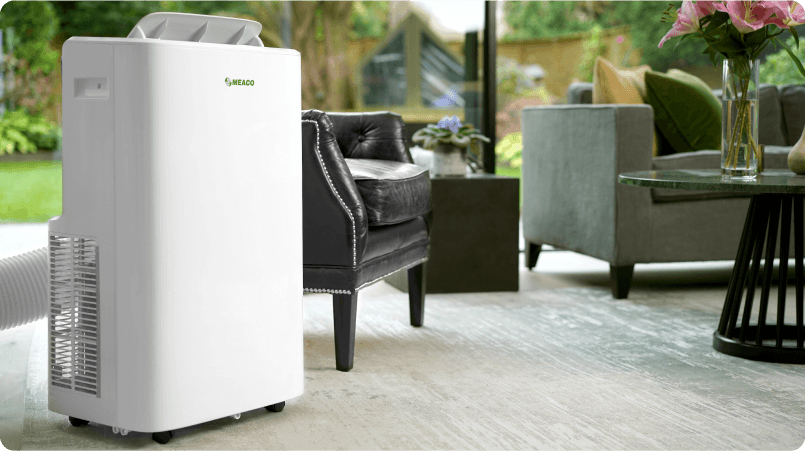Choosing the right air conditioner unit for your home or office can be a daunting task, especially in the UK with its varying climate and weather conditions. Likewise, there are so many different models, features, and price points to pick from. So, which one is right for you?
Our ultimate air conditioner buying guide will make you an expert in finding the right air conditioning system that fits your needs and budget.
- Your room and unit size
- How powerful do I need my air conditioner to be?
- BTU calculator
- Portable air conditioners
- Wall split air conditioning systems
- Ceiling air conditioners
- Commercial air conditioning units
- Things to consider
- Do air conditioners require maintenance?
- Are air conditioners safe?
Your Room and Air Con System Size
Measuring your room space is essential to picking the right air conditioning unit. The measurements should include the length, width and height of your room and account for any alcoves, windows, and doors.
This will help you narrow down the power of the unit you will need, here is why...
Undersized
Having an undersized air conditioner means you do not have enough BTUs to cool the room adequately. Also, the unit will be constantly running, putting a strain on the system, which could cause the unit to breakdown. For these reasons it is always better to choose a slightly bigger, more powerful unit, than a smaller, cheaper model. Although slightly more expensive in the short-term, it will pay off overall.
Oversized
On the other hand, buying a unit that is far too large for the room will add extra costs to your budget (usually an extra £200-300). The extra cost is unnecessary, plus the bigger unit will be more cumbersome, taking up valuable floor space. Being physically bigger, they will be heavier and less portable to move around the home or store away when not needed.
Top Air Conditioner Tips:
Use our BTU calculator to work out which sized unit is best for you.
Our portable air conditioners collection handily sorts units by room size for you.
How Powerful Do I Need My Air Conditioner to Be?
An air conditioners’ power is measured in BTUs (British Thermal Units)*.
As explained above, the size of your room should determine the BTUs you need. The higher the BTU, the more powerful the unit will be. As a general guide, we recommend 7,000 BTUs of cooling power for 9 sqm of space.
For example, if your room is 16sqm you need at least 9,000 BTUs. If your room is 36sqm, you would need 17,000 BTUs to work effectively. However, this is just a general guide and it is going to be individual to you and will depend on multiple factors.
*A BTU is a measurement of how much energy something has. For example, one BTU is the amount of energy it would take to heat up one pound of water by 1° Fahrenheit.
| Room Size | BTU** | |
|---|---|---|
| Sq. ft. | Sq. m | |
| <97 | <9 | up to 7,000 |
| 97 | 9 | 7,000 |
| 172 | 16 | 9,000 |
| 269 | 25 | 12,000 |
| 388 | 36 | 17,000 |
| >388 | >36 | 17,000+ |
**BTUs are calculated based on the average ceiling height in the UK of 2.4m, considering 2 people and 1 appliance.
Top Tip
You can always run two smaller units in a large room, rather than just one large unit.
BTU Calculator
Use our handy BTU calculator to work out the specific BTUs required for your air conditioner. It works this out from your room size and how the room is used.
When calculating BTUs, you will have to consider windows (especially if they are south facing or a conservatory), the number of people that are usually in the room (yes, we give off heat too!), and the number of electrical appliances used in the room. These factors can increase the BTU requirement in addition to room size.
What If the BTU Calculator Suggests a BTU That Is Unavailable in an Air Con Unit?
We advise going for the more powerful unit that is available.
For example, imagine the calculator suggests you need 8,000 BTUs to cool your room. However, most air con units around that power are 7,000 BTUs or 9,000 BTUs. What do you do? In this case, go for the bigger 9,000 BTU air conditioner. It will adequately cool the room and not put strain on the unit. And do not worry about extra running costs, the unit’s thermostat will stop the motor running once the room is at the desired temperature.
Now that you know the BTUs you need, you can move on to choosing the right type of air conditioner.
Types of Air Conditioners
Portable Air Conditioners
Portable air conditioning (PAC) units are the most popular type of air conditioner used in UK homes. They are versatile, cost effective and great for the British weather – just get them out when needed, and then store them away again when the temperature drops. These units offer a fantastic way to cool rooms down quickly and effectively, right from the box.
With a portable AC unit, you can enjoy the comfort of cool air in any room of your home quickly and easily. Overall, portable air conditioners are an efficient and convenient way to keep your home cool and comfortable, even on the hottest days of the year.
Pros of Portable Air Con Units
Portable air conditioners are very popular and make up 90% of our air conditioner sales. They are cost effective, easy to use, and (as the name suggests) can be moved around the home. Portable air conditioners can be stored away when not needed and require little maintenance (just a light clean now and again). As they work straight from the box, they require no professional installation. Just plug them in and let the cooling begin.
The units we sell come with the latest features seen on high-end cooling and ventilation systems. Look for Wi-Fi/App connectivity, allowing you to set schedules when you are not at home. Imagine the joy of walking into a cooled room on a sweltering day! You can even control them through your Alexa or Google Home smart speaker – if picking up the remote is too much hard work.
Some air conditioners even offer heating and dehumidifier settings, making them versatile all year round.
Read more on that in our Using Your Portable Air Conditioner All Year Round.
Cons of Portable Air Con Units
The downside to portable air cons is the venting requirement. They need to be positioned so they can vent warm air outside. This could be through a window, using a window kit, or a purpose-built vent hole through the wall. This makes them less attractive if you do not have these options available or are concerned about the aesthetics. Another concern is the noise. Because the cooling motor is inside the unit, it makes them louder than a wall split air conditioner.
Pros
Affordable
Easy to move around
No installation required
Cons
Less powerful than other types of units
May struggle to cool larger spaces effectively
Requires a window or door for venting
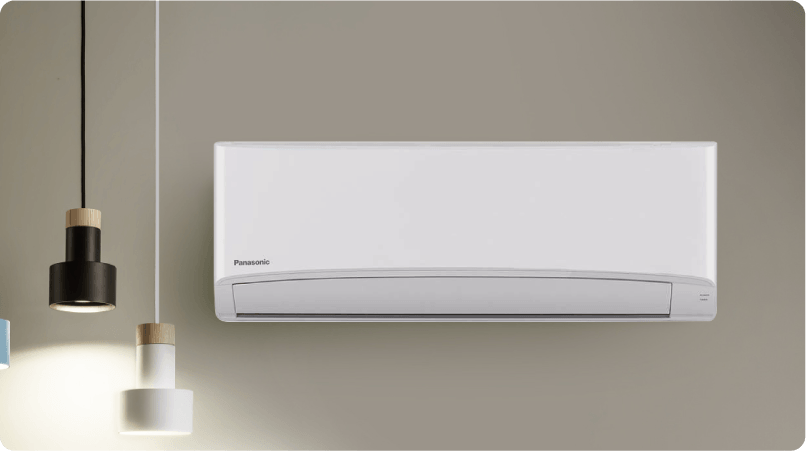
Wall Split Air Conditioning Systems
A wall split air conditioner, or sometimes known as a “wall mounted” AC, is a cool way to beat the heat. It's got two parts: one unit that goes inside your home on your wall, and another one outside with all the heavy-duty stuff like the compressor. They're linked together by electrical and refrigeration lines. This setup is super-efficient for cooling down specific rooms or areas in your house.
Pros of Wall Split Air Conditioning
Wall split units offer a sleek and professional solution to cooling and heating. As the name suggests, the unit is split in to two sections. This provides more floor space, less trip hazards and maintains the aesthetics of the room. They are incredibly quiet and more powerful than portable air conditioners.
Cons of Wall Split Air Conditioners
The benefits unfortunately come at a cost. A wall split air conditioning system is much more expensive to both buy and install. Once installed, it cannot be moved around the home. The cooling motor (a sizable grey looking box) is located outside the property, which could be unsightly.
We can sell you a wall split unit, but it cannot be installed by anyone but an F-Gas registered engineer. And as you can imagine, this process takes more time and planning - not great when you need cooling now.
Installation
To comply with relevant regulations and installations in the UK, you will need an F-Gas registered engineer to install a wall split air conditioning system. This could run five to ten times more expensive than their portable counterpart.
To find local F-Gas registered installers, you can search websites such as Checkatrade or TrustATrader.
Pros
Energy efficient
Cools a room quickly
Reduced noise level
Cons
Requires professional installation
Higher initial costs
Fixed unit, not portable
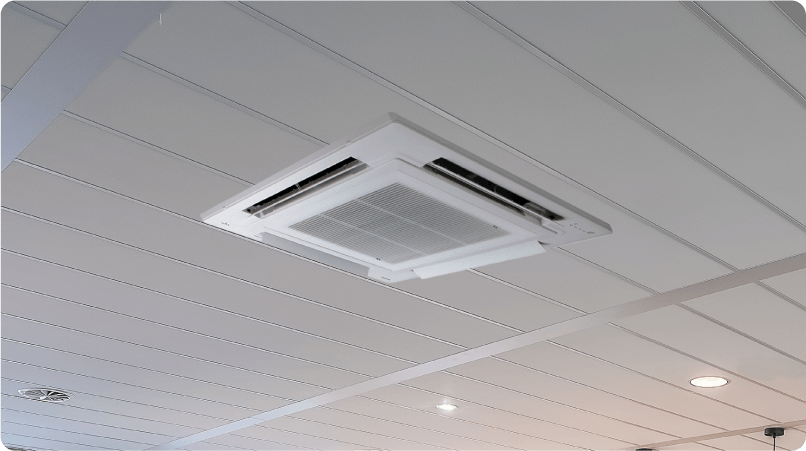
Ceiling Air Conditioners
Consider ceiling air conditioners if you have restricted wall space in large commercial buildings. These units fit discreetly into the ceiling, distributing an even flow of cool air throughout the area. Plus, they operate quietly and are energy efficient. However, it is important to note that ceiling air conditioners come with a higher price tag and must be installed by a qualified professional.
Pros
Even cooling throughout a space
Relatively quiet and energy efficient
Good for spaces with limited wall space
Cons
More expensive than other types of units
Require professional installation
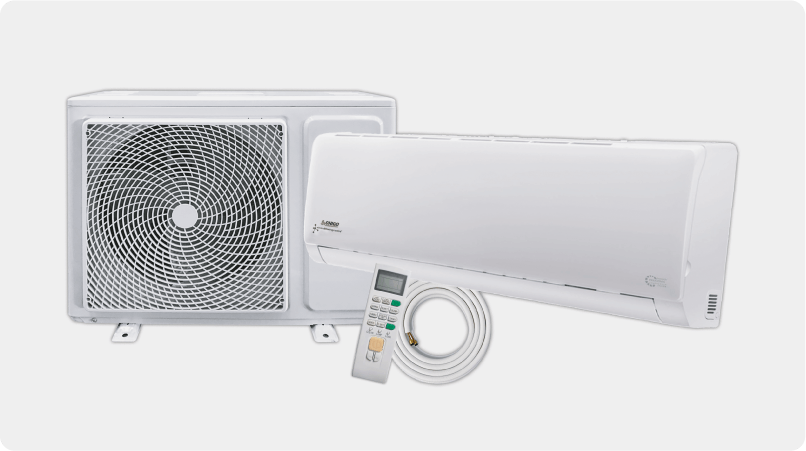
Commercial Air Conditioning Units
Commercial air conditioning units are designed for large commercial spaces such as offices, shopping malls, and hospitals. They are powerful and can provide cooling for large areas. They are also customisable to fit the specific needs of a space, such as the number of occupants, humidity levels, and air quality. However, they are the most expensive option and also require professional installation and maintenance.
Pros
Powerful and customisable for
large commercial spaces
Good for specific needs such as
humidity levels and air quality
Cons
Are the most
expensive option
Requires professional
installation and maintenance
Not suitable for home use

What to Consider Before Buying an Air Con System
How Are You Able to Vent The Air Con Unit?
Most air conditioning units require some form of venting, whether through a window, wall, or ductwork. Consider the layout of your space and choose a unit that can be vented in a way that works for you. If you're using a portable unit, look for one with a flexible hose that can be adjusted to fit your space.
What Features Are You Looking For?
There are different features that come with air conditioning units. Here are a few examples:
Programmable Thermostat
A unit with a programmable thermostat allows you to set the temperature and schedule the air conditioner to turn on and off at specific times, saving energy and money.
Air Filtration
An air conditioner with a good filtration system can remove allergens, dust, and other particles from the air, improving air quality and reducing allergy symptoms.
Noise Level
Air conditioners can be noisy, and some units are louder than others. Choosing a unit with a low decibel level can improve comfort and reduce disturbance. Some units have a Sleep Mode to reduce the noise level during the night.
Smart Features
Some air conditioners come with smart features that allow you to control the unit remotely through a smartphone app, voice commands, or home automation systems.
Do Air Conditioners Require Maintenance?
Maintaining your air conditioning unit is an essential task that can greatly benefit your overall health and safety. One of the critical components of your air conditioning system is the filter, which plays a significant role in ensuring that the air you breathe is clean and free of pollutants. A dirty filter can cause your unit to work harder, which can lead to breakdowns and costly repairs. To avoid these problems, it's crucial to clean or replace your filter regularly. Remember, always follow your manufactures directions. And if your air conditioner is a wall spilt unit or commercial, you must have a F-Gas registered engineer maintain and service your unit, you cannot do this yourself unless you have the relevant qualifications.
Moreover, safety should always be a top priority when dealing with air conditioning units. Therefore, it's crucial to keep the surrounding area clear of any obstructions, such as furniture or plants, and to ensure that your unit is installed correctly. By adhering to these maintenance tips, you'll be able to keep your air conditioning unit in optimal condition and enjoy safe, pleasant air quality.
Are Air Conditioners Safe?
Yes, air conditioners are safe to use if you follow the manufacturer’s instructions. They should be regularly serviced, and all parts of the system must be in good working order for it to operate safely. Air conditioning units also come with safety features such as auto shut-off and built-in safety sensors that will turn the unit off if the temperature drops to a certain level.
If it's a spilt wall AC unit, make sure your air conditioner is installed by an F Gas registered installer and that you follow all safety precautions when operating the unit such as keeping combustible materials away from the condenser and not blocking the vents. With all this in mind, make sure to take the appropriate safety precautions when selecting and using your air conditioner.
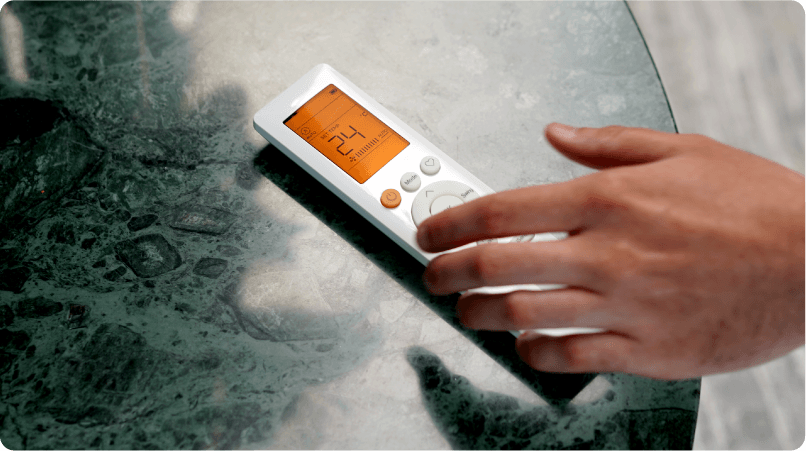
To pick the right air conditioning unit for you, you have to consider factors like space size, noise preferences, budget, and specific features that meet your needs. Wall-mounted, ceiling, or commercial units each offer unique advantages. You also have to keep in mind venting options, features, and maintenance requirements. Proper installation and maintenance extend the unit's lifespan and ensure safe, high-quality air conditions. By carefully considering these factors, you can make an informed decision when choosing an air conditioning system.
Want to learn more about air conditioners? Check out our other articles:
- Air Conditioners FAQs
- Top 10 Portable Air Conditioners
- Using your Portable Air Conditioner All Year Round
- Air Conditioner Maintenance Guide
- How to get the Most From your Air Conditioning unit
- 5 Uncommon Ways to Keep your Home Cool
- Cost Saving Ways to Keep your Home Cool
- For all our cooling related articles here









 Drying Clothes Dehumidifiers
Drying Clothes Dehumidifiers
 Low Energy Dehumidifiers
Low Energy Dehumidifiers
 Commercial Dehumidifiers
Commercial Dehumidifiers
 Dehumidifier Accessories
Dehumidifier Accessories
 Humidifiers & Air Purifiers
Humidifiers & Air Purifiers
 Inline Fans
Inline Fans
 Kitchen Extractor Fans
Kitchen Extractor Fans
 Bathroom Extractor Fans
Bathroom Extractor Fans
 Commercial Extractor Fans
Commercial Extractor Fans
 Shower Extractor Fans
Shower Extractor Fans
 Silent Extractor Fans
Silent Extractor Fans
 Heat Recovery Extractor Fans
Heat Recovery Extractor Fans
 PIV & Whole House Ventilation
PIV & Whole House Ventilation
 Extractor Fan Accessories
Extractor Fan Accessories
 Extractor Fan Controllers
Extractor Fan Controllers
 Panel Heaters
Panel Heaters
 Portable Heaters
Portable Heaters
 Fan Heaters
Fan Heaters
 Patio Heaters
Patio Heaters
 Storage Heaters
Storage Heaters
 Towel Rails
Towel Rails
 Air Curtains
Air Curtains
 Underfloor Heating
Underfloor Heating



 Time Controllers
Time Controllers
 Heating Clearance
Heating Clearance
 Conservatory Heaters
Conservatory Heaters
 Portable Air Conditioners
Portable Air Conditioners
 Air Coolers
Air Coolers
 Wall Mounted Air Conditioning Units
Wall Mounted Air Conditioning Units
 Commercial Cooling
Commercial Cooling
 Ceiling Cassette Air Conditioning
Ceiling Cassette Air Conditioning
 Desk Fans
Desk Fans
 Pedestal Fans
Pedestal Fans
 Floor Fans
Floor Fans
 Tower Fans
Tower Fans
 DC Fans
DC Fans
 Air Circulators
Air Circulators
 Ducting Kits
Ducting Kits
 Internal Grilles
Internal Grilles
 External Grilles
External Grilles
 Ducting Hose
Ducting Hose
 Ducting Clamps
Ducting Clamps
 Ducting Connectors
Ducting Connectors
 Compressor Dehumidifiers
Compressor Dehumidifiers
 Desiccant Dehumidifiers
Desiccant Dehumidifiers
 Electric Radiators
Electric Radiators
 Oil Filled Radiators
Oil Filled Radiators
 Oil Free Radiators
Oil Free Radiators
 Under Sink Water Heaters
Under Sink Water Heaters
 Over Sink Water Heaters
Over Sink Water Heaters
 Unvented Water Heaters
Unvented Water Heaters
 Instant Water Heaters
Instant Water Heaters
 Hand Wash Units
Hand Wash Units
 Electric Heaters
Electric Heaters

